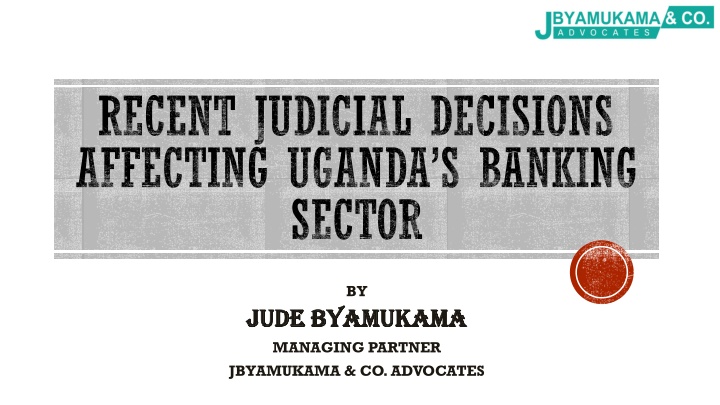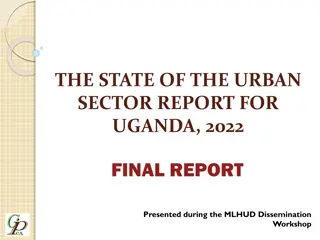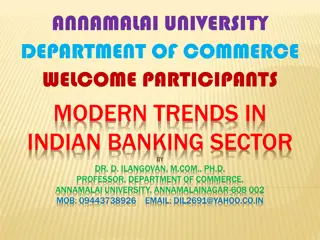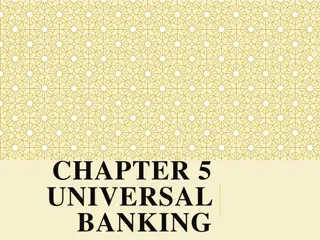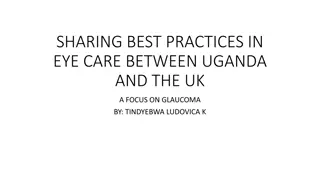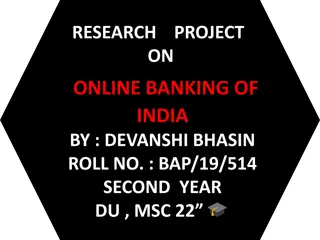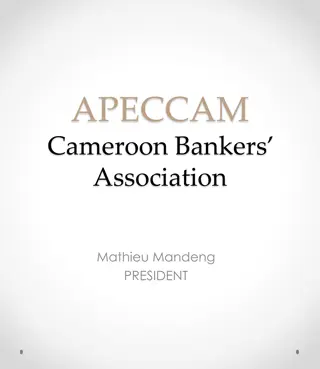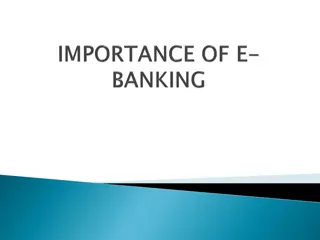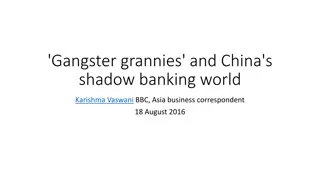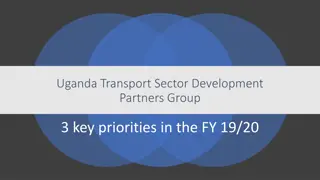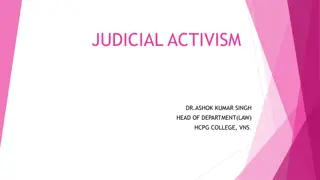Recent Judicial Decisions Impacting Uganda's Banking Sector
The judicial decisions regarding Uganda's banking sector, including issues like cryptocurrencies, digital fraud, bank valuers' liability, and property disputes, highlight crucial legal precedents and implications for both banks and customers. These rulings provide insights into the evolving landscape of banking litigation in Uganda.
Download Presentation

Please find below an Image/Link to download the presentation.
The content on the website is provided AS IS for your information and personal use only. It may not be sold, licensed, or shared on other websites without obtaining consent from the author.If you encounter any issues during the download, it is possible that the publisher has removed the file from their server.
You are allowed to download the files provided on this website for personal or commercial use, subject to the condition that they are used lawfully. All files are the property of their respective owners.
The content on the website is provided AS IS for your information and personal use only. It may not be sold, licensed, or shared on other websites without obtaining consent from the author.
E N D
Presentation Transcript
RECENT JUDICIAL DECISIONS AFFECTING UGANDA S BANKING SECTOR BY JUDE BYAMUKAMA JUDE BYAMUKAMA MANAGING PARTNER JBYAMUKAMA & CO. ADVOCATES
BACKGROUND 1. The Courts of Law have delivered important decisions touching conduct of banking business, mortgagees rights, lenders recovery rights, rights of bank customers and digital fraud in the banking sector. These decisions are a must read to appreciate the state of litigation involving banks irrespective of whether Counsel acts for banks or borrowers. 2. We will look at critical decisions from the High Court, Court of Appeal, Constitutional Court and lastly the Supreme Court. A quick disclaimer: It should be noted that some of the decisions highlighted below are subject of pending appeals. The position of the law espoused in these precedents may therefore change. 10/11/2023
HIGH COURT DECISIONS There is no doubt that globally, cryptocurrencies are not going away. However, several regulators remain sceptical of their usage. In Silver Kayondo vs Bank of Uganda MC 109 of 2022, the high court held that the central bank s directives stopping recognition of cryptocurrencies are not illegal or irrational. The decision affirms the hostile attitude of central banks towards cryptocurrencies.
With the prevalence of digital fraud in the banking sector, particularly with the advent of mobile banking, the High Court decision in Aida Atiku vs Centenary Bank, Civil Suit No 754 of 2020 gives some comfort to banks. The High Court (Mubiru J) held that bank customers have the duty and responsibility to keep banking information, user IDs, passwords and PINs confidential and in default, any fraud resulting from such omissions or negligence cannot be visited on the bank. In this case, the High Court ruled that the plaintiff, a bank customer, was either negligent or had willingly given away her confidential access codes hence she could not seek to recover from the bank the losses resulting from fraudulent withdraws on her account.
EMERGING PRECEDENTS In a development that professionals advising bankers should note carefully, numerous precedents have emerged in the past few years of bank valuers being held liable to indemnify banks for negligent valuation reports. Valuers have been held to be liable in negligence and breach of contract for careless or misleading valuation reports in respect of collateral securities. See KCB Bank Uganda Ltd vs Eddie Nsamba & Others, Civil Suit No.640 of 2013 decided in 2021 for instance.
SUBJECT OF FRAUD Still with the subject of fraud, the High Court in Christine Hope Kanyima vs Mercantile Credit Bank Limited & Christ Kanyima, MC 0085 of 2021 has ruled that the test for whether a property constitutes matrimonial property is fact specific and based on factors such as whether both spouses regularly use the home for residential purposes. The test under Section 38A of the Land Act for family land is equally objective. The mere fact that a mortgagee had procured impersonation of his actual spouse and presented a fraudulent spousal consent to the bank was held not to be sufficient grounds for invalidating the mortgage as the property in issue could not qualify as either family land or matrimonial property.
Sale by Private Treaty In a set back to lenders having recourse to sale of mortgaged property by way of private treaty, the High Court ruled in Letshego Uganda Limited vs Felix Kulayigye Originating Summons No.5 of 2020 that Section 28(1)d of the Mortgage Act 2009 and Regulation 10 of the Mortgage Regulations 2012 require that a mortgagor must specifically consent by a notice to sale by private treaty and such consent cannot be retrospectively issued through recourse to the terms of the mortgage deed.
The transfer of assets in form of leased properties of one closed bank by Bank of Uganda as regulator to other banks continues to generate litigation. The interplay between the provisions of the Financial Institutions Act 2005 on powers of the liquidator of banks (Sections 94 and 95) on one hand and the express provisions of the Registration of Titles Act Cap. 230. In Meera Investment Limited vs DFCU Bank Ltd & Anor, CS 948 of 2017, the high court ruled that the concept of statutory transfer of leased properties was not envisaged within the FIA 2005. As a consequence, the transfer of leased properties to the Defendant Bank without consent of the lessor (the Plaintiff) was held to be illegal.
COURT OF APPEAL DECISIONS Perhaps the most important decision that bankers and borrowers alike must pay close attention to is Civil Appeal No.56 of 2015 Barclays Bank of Uganda Ltd vs Golf View Inn (U) Limited decided on the 4th of August 2023. The record indicates that the matter is proceeding to the Supreme Court. However, the legal positions promulgated in this decision are quite significant for banks, the borrowers and counsel.
Firstly, the Court of Appeal has ruled that Service Level Agreements (SLAs) between banks and their external counsel governing remuneration in debt recovery cannot bind borrowers or third parties. In the context of this case, it was held that the bank s external counsel could not recover 6% of the total debt recovered from the borrower in default as its legal fee. Secondly, SLAs between the bank and external counsel are required to be prepared in compliance with Sections 50 and 51 of the Advocates Act and non compliance renders such Agreements illegal. Thirdly, the extent to which the bank may debit the customer s loan account for recovery expenses is limited and not entirely at the bank s whims and wishes. Recovery expenses must be reasonable and fair otherwise a borrower whose securities have been realised may still have a right to an action to recover expenses unfairly debited from the recovery account.
The Court of Appeal also upheld the High Court decision in Crane Bank Ltd (In Receivership) vs Sudhir Ruparelia & 2 others that a bank in receivership can not institute suits and lacks the locus standi to do so. The decision emphasizes that a strict interpretation of the provisions of the FIA 2004 do not provide room for a bank under receivership to institute litigation. The Central Bank as statutory manager or a duly appointed liquidator have such powers to institute litigation in the name of such bank but the FIA did not envisage a Receiver having such powers.
CONSTITUTIONAL COURT In a decision that must have been given considerable relief to banks, the Constitutional Court in Ferdsult Engineering Services Ltd & another vs the Attorney General & Absa Bank Uganda Ltd, CP No.18 of 2021, the Justices of the Court upheld the Constitutional validity of Regulation 13(1) of the Mortgage Regulations No.2 of 2012. The Regulation requires a deposit of 30% of the forced sale value of mortgaged property or outstanding amount in order to be able to postpone a sale by public auction.
It should be recalled that in CACA 54 of 2016 Ganafa Peter Kisawuzi vs DFCU Bank Ltd, the Court of Appeal ruled that an order of temporary injunction stopping an intended sale of mortgaged property cannot be granted to an applicant in breach of Regulation 13. The Court approved of the reasoning of Mubiru J in Housing Finance Bank Limited vs Silk Events Limited & anor, Civil Appeal No.300 of 2021 that the Regulation in issue strikes a balance between the competing desire by the mortgagee to realise the security upon default and the mortgagor s desire to have his/her day in court on questions of legality of the process.
In important reprieve for bankers and their customers, the Constitutional Court has ruled in ABC Capital Bank (Ltd) and 30 others vs AG & CG, URA, CP No.14 of 2018 that the tax payers constitutional right to privacy of their banking information cannot be violated even by the tax man. The Court held that the Commissioner General must always respect the right to privacy of the tax payers under Article 27 while exercising powers under Sections 41 and 42 of the Tax Procedure Code Act. However, the said provisions were held to be valid subject to the proviso that the powers therein should be exercised pursuant to an investigation in a tax matter based on reasonable grounds or probable cause to avoid offending the right to privacy.
CONSTITUTIONAL CHALLENGES The manner in which the central bank, Bank of Uganda, has handled closure of commercial banks continues to generate disputes and complaints. The provisions in the Financial Institutions Act 2004 under which the central bank appears to exercise powers to place banks in receiverships were subject of a constitutional challenge. In Humphrey Nzeyi vs Bank of Uganda & Attorney General, CP 44 of 2012 decided on 4th November 2020, the Constitutional Court justices, with a 4- 1 majority, ruled that the provisions of the FIA do not offend the constitution albeit subject to the proviso that there may be a scenario where the process and manner of winding up a bank may be done unconstitutionally. The Court equally ruled that there may be situations where the regulator may have to act quickly to avert a systemic failure in the financial system or give confidence to the banking public.
THE SUPREME COURT SAVES SYNDICATED LENDING INVOLVING FOREIGN BANKS The Supreme Court s most important decision for the banking sector was no doubt Ham Enterprises Ltd & 2 Others vs Diamond Trust Bank (U) Ltd and Diamond Trust Bank (K) Ltd, SCCA 13 of 2021. The Justices of the Supreme Court unanimously ruled that syndicated lending which involves foreign banks does not contravene the Financial Institutions Act 2004. In a highly anticipated decision, the Supreme Court ruled on Tuesday 14th June 2023 that a syndicated loan facility arranged between a local bank Diamond Trust Bank Uganda Limited and a foreign bank for benefit of Ugandan borrowers, Ham Enterprises Ltd & Kiggs International (U) Ltd was lawful and does not contravene the Financial Institutions Act 2004. Additionally, the court ruled that no legal provision forbids foreign financial institutions from extending credit facilities to any financial institution or person in Uganda. As a consequence, the apex court affirmed the decision of the Court of Appeal that overturned a high court judgment that had found that such syndicated facility offended the Financial Institutions Act 2004.
The Supreme Court also recently ruled in Formula Feeds & 3 Others vs KCB, SCCA 13 of 2020 that personal guarantees of directors of a borrower are directly enforceable even where the rest of the security documentation, specifically a mortgage deed, is found to be invalid and unenforceable. The borrower s argument that illegalities surrounding the mortgage deed affected the root of the entire loan documentation and personal guarantees of directors was rejected by the supreme court and the lower courts as well.
CONCLUSION As is evident, the bankers have reason to smile: the emerging jurisprudence is quite favourable to the banking sector especially in terms of protecting creditor s rights of recovery against borrowers. Borrowers have reason to worry; prevailing against banks in the courts of law is quite a tall order. The courts appear to have quite a high threshold for ruling against alleged or perceived predatory behaviour of banks.
ACKNOWLEDGEMENT I acknowledge the input of Associates at JByamukama & Co. Advocates; Philip Mwesiga, Patience Babiwemba, Prishia Noowe and Blaise Rugamba in the preparation of this presentation.
THE END THANK YOU JByamukama & Co. Advocates Plot 102, Kanjokya Street, Kamwokya P.O Box 1430, Kampala, Uganda, Landline: +256702153035 Email: admin@jbyam.com Website: www.jbyam.com
